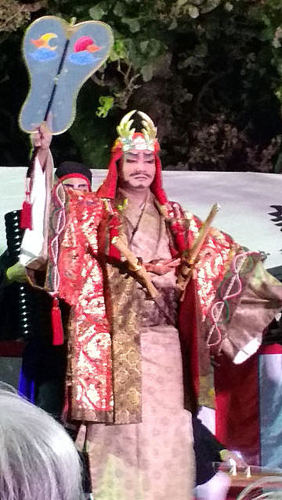Amawari

Amawari was a lord (anji) of Katsuren gusuku, known in official Ryûkyû Kingdom histories, legend, and theatre traditions for his ambitions for the throne and for his schemes and attack against Gosamaru, anji of Nakagusuku, but celebrated in the Omoro sôshi (Ryûkyû's oldest compilation of songs and legends) as praiseworthy and on par with the king.
Life
According to legend, Amawari was born to a peasant family in Yara, in Chatan magiri[1]. Some historians have suggested that, judging from the political circumstances and from legends/historical context regarding associations between the kings and Katsuren, Amawari may have been a relative or close ally of King Shô Hashi.[2] Still, the traditional accounts relate that, after toppling the lord of Katsuren gusuku, Amawari seized his domain[1]. Taking advantage of opportunities for maritime trade, he gained a degree of wealth and power, and married Momoto Fumiagari, daughter of King Shô Taikyû, further solidifying his power[1][3].
Anxious about Amawari's power, King Shô Taikyû arranged that a new castle be built at Nakagusuku, under the command and supervision of the anji (aristocrat/lord) Gosamaru, between Katsuren and the royal capital of Shuri. In 1458, Amawari accused Gosamaru of plotting to overthrow the king, and as a result came to lead the royal armies in an attack on Nakagusuku which ended in Gosamaru's death by suicide. Amawari then plotted to overthrow the king himself, but, his plan discovered by his wife and her attendant Oni Ōgusuku, he was attacked and defeated by royal forces led by the latter[1], and executed. An alternate theory, however, claims that the entire affair was organized by the royal government, in order to remove both Gosamaru and Amawari as powerful rivals and potential threats to the succession[4].
The tale of Gosamaru's betrayal and destruction by Amawari is among the more famous and popular of local historical legends. A kumi odori dance-play telling of Gosamaru's sons' quest for revenge against Amawari, was once performed as part of the kingdom's formal entertainment of Chinese investiture envoys, and has in more recent times become a popular favorite[5].
Though he is introduced as a traitor in most history books, Amawari is praised by the peasantry in the omoro, oral traditional songs and poems relating history and legend[1].
References
- ↑ 1.0 1.1 1.2 1.3 1.4 "Amawari." Okinawa rekishi jinmei jiten (沖縄歴史人名事典, "Encyclopedia of People of Okinawan History"). Naha: Okinawa Bunka-sha, 1996. p10.
- ↑ Gregory Smits, Maritime Ryukyu, University of Hawaii Press (2019), 110.
- ↑ Other sources describe this marriage as an effort by the king to check Amawari's opposition. ("Momoto Fumiagari." Okinawa Compact Encyclopedia 沖縄コンパクト事典. Ryukyu Shimpo, 1 March 2003.)
- ↑ "Gosamaru-Amawari no hen." Okinawa konpakuto jiten (沖縄コンパクト事典, "Okinawa Compact Encyclopedia"). Ryukyu Shimpo (琉球新報). 1 March 2003. Accessed 25 July 2009.
- ↑ Okinawa G8 Summit Host Preparation Council. "Three Castles, Two Lords and a Ryukyuan Opera." The Okinawa Summit 2000 Archives. Accessed 25 July 2009.